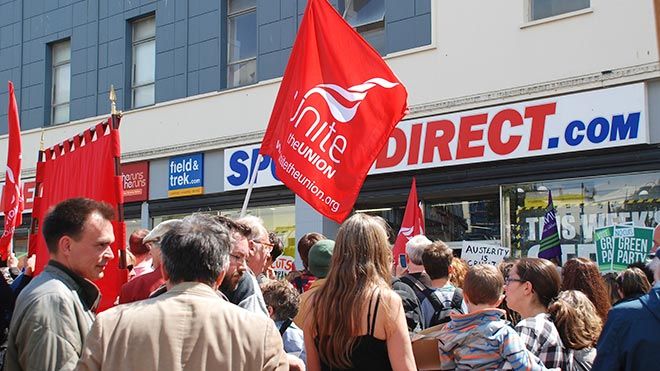Another Sports Direct general meeting – and another TUSO letter to shareholders

UPDATE: Both resolutions have been defeated. The first, on the executive share scheme by 66 per cent and the second, on John Ashley, by 71%.
Despite holding their Annual General Meeting in September, the Sports Direct board have unexpectedly called another general meeting for shareholders taking place today, 13 December.
Sports Direct still has many problems to resolve. Following the resolution filed by Trade Union Share Owners at its 2016 AGM, supported by a majority of independent shareholders, the company committed to commissioning an independent review of human capital management practices. But this never took place.
The company also committed to offering all its workers on zero-hours contracts the option of moving onto fixed or minimum hours contracts; but this has not been rolled out to the thousands of workers employed through agencies on short-hours contacts. Still more serious, workers employed through employment agency Transline have not been paid the back pay they are owed through non-payment of the national minimum wage: Transline has gone into administration and Sports Direct has refused to take responsibility for these payments itself. And the company committed to engage in constructive talks with Unite - but these have never really got off the ground. Unite continues to call for the company to return to the table.
Rather than tackling these serious outstanding issues, the company has put forward two proposals to boost the pay of three senior executives at the company, to be put to the vote at today’s general meeting. Trade Union Share Owners has written to Sports Direct investors, calling on them to reject both proposals.
The first proposal seeks to guarantee a minimum share price for the company’s executive share scheme – which has only two members, Karen Byers and Sean Nevitt, both executive board members.
Guaranteeing a minimum share price for executive share schemes contradicts the rationale for having equity as an incentive and contravenes widely-accepted corporate governance principles.
The second proposal is even more surprising. It seeks shareholder approval to pay John Ashley, Mike Ashley’s brother, over £11million out of company funds. The board argues that had John Ashley participated in various bonus and share schemes available to other members of the senior management team, this is what he would have gained, net of other benefits since resulting from his position in the company.
This resolution reflects serious weaknesses in corporate governance practice at the company, but does nothing to address these weaknesses. If appropriate systems had been in place at the time when John Ashley was originally employed, there would be no need to review his compensation after the fact. And despite the size of this proposed payout, no detail is given about how the figure has been derived.
Even more serious than the corporate governance implications is the message these proposals send that boosting bonuses for highly-paid executives is more important to the company than guaranteeing decent wages for its low-paid workers. Thousands of Sports Direct workers are paid less than the Real Living Wage of £8.75 an hour; they experience ongoing financial insecurity caused by low pay and variable working hours. And as highlighted above many agency workers at Sports Direct have not been paid money that they are owed for non-payment of the legal National Minimum Wage.
Surely paying money owed to low-paid workers should be a higher priority for company funds than boosting the pay of already highly-paid executives?
You would have thought so – but then, this is Sports Direct.
Stay Updated
Want to hear about our latest news and blogs?
Sign up now to get it straight to your inbox
